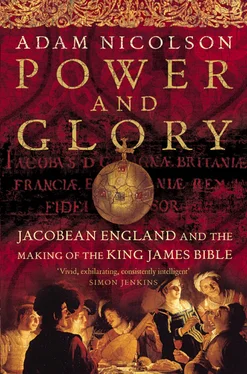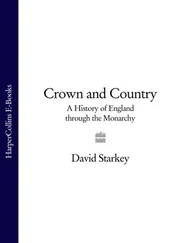To survive in this net of hostility, James had been forced to compromise and dissemble, to become cunning and to lie. His favourite tag was from Tacitus: âThose who know not how to dissimulate, know not how to rule.â His face had become sly, his red, tufty moustache hanging down over his lips, his eyes somehow loose in their sockets. He regards his portrait painters with an inward, wary, intellectual look. Out of his mouth he would occasionally shoot harsh, witty, testing jokes. The sight of a drawn sword could make him faint and on his body the glorious gold-threaded doublets and ermine capes looked like fancy-dress; a private, isolated, cunning man disguised as a king. Elizabeth had been painted holding a rainbow, standing astride the map of England, bedecked with the symbols of purity. James in his portraits (he hated being painted) never reached for any mythological significance: he sat or stood red-faced, bad-tempered, irredeemably a man of this world, no distant image of a king but a king whose task, as Godâs lieutenant, was to resolve and unify the tensions and fractures of his kingdom.
His upbringing had been deeply disturbed. David Rizzio, secretary and lover of Mary, Queen of Scots, was brutally murdered in an adjoining room as she listened to his screams. James was in her womb at the time. His father, the charming Henry Darnley, was murdered by his motherâs next lover, the Earl of Bothwell, blown up when lying ill in his Edinburgh house. James never saw his mother after he was one year old and, although baptised, like her, a Catholic, was then put in the care of a string of terrifying Presbyterian governors, in particular George Buchanan, a towering European intellectual, the tutor of Montaigne, friend of Tycho Brahe, who considered the deposing of wicked kings perfectly legitimate, and whose memory continued to haunt James in adult life. As a boy king, he had been a trophy in the hands of rival noble factions in Scotland, kidnapped, held, threatened and imprisoned. âI was alane,â he wrote later, âwithout fader or moder, brither or sister, king of this realme, and heir apperand of England.â
James retreated from the brutality and anarchy. He became chronically vulnerable to the allure of beautiful, elegant, rather Frenchified men. He loved hunting, excessively, an escape from the realities, at one point killing every deer in the royal park at Falkland in Fife, which had to be restocked from England. It has been calculated that he spent about half his waking life on the hunting field. And he became immensely intellectual, speaking âGreek before breakfast, Latin before Scotsâ, composing stiff Renaissance poetry, full of a clotted and frustrated emotionality, translating the Psalms, capable on sight of turning any passage of the Bible from Latin to French and then from French to English.
In 1584, when James was eighteen, the French agent Fontenoy sent home a report on this strange, spiky-edged, intellectualised, awkward and oddly idealistic king:
He is wonderfully clever, and for the rest he is full of honourable ambition, and has an excellent opinion of himself. Owing to the terrorism under which he has been brought up, he is timid with the great lords, and seldom ventures to contradict them; yet his special concern is to be thought hardy and a man of courage ⦠He speaks, eats, dresses, dances and plays like a boor, and he is no better in the company of women. He is never still for a moment, but walks perpetually up and down the room, and his gait is sprawling and awkward, his voice is loud and his body is feeble, yet he is not delicate; in a word he is an old young man.
Fontenoy had asked him about the time he spent hunting: âHe told me that, whatever he seemed, he was aware of everything of consequence that was going on. He could afford to spend time in hunting, because when he attended to business he could do more in an hour than others could do in a day.â
Behind the bravado lay weakness. Scotland was no place to be a king. The English throne, infinitely more powerful in relation to the nobility than his own; supported by the structures and doctrines of the church, rather than eroded and undermined by them; rich, potent and admired â all this awaited him like a harbour tantalisingly visible from far out to sea, but, until Elizabethâs death, only to be longed for and lusted after.
Elizabeth taunted him. James had often sent his spies to Whitehall or to Richmond to see how near to death the ageing queen was coming. But the English Council was aware of this too and whenever a curious Scotsman seemed to be watching and attending on the queen more carefully than usual, it was arranged for him to stand waiting in a lobby from where he could see, âthrough the hangings, to the queen dancing to a little fiddleâ. Over and over again, James would hear reports of her fitness and her vigour.
Meanwhile, she dandled her kingdom and her money in front of his eyes. There were other claimants to the English throne, but none so strong. Both his mother and father carried Tudor genes but Elizabeth would make nothing sure. In 1586, all too vaguely, she had promised to do nothing that would take away from âany greatness that might be due to him, unless provoked on his part by manifest ingratitudeâ. She began to send him money, and in the letters that accompanied the cash, Elizabeth allowed herself to speak to James from the enormous and magnificent height of an imperial throne. As she wrote to him in June 1586:
Considering that God hath endewed ws with a crown that yeildeth more yerly profeit to us, than we understand yours doth to youe, by reason of the dissipation and evill governement thereof of long tyme before your birth, we have latelie sent to youe a portion meete for your awin privat use.
The English carefully varied the amount from year to year, sometimes £3,000, sometimes £5,000, so that James would never quite know where he stood. The Scots always called the grant an âannuityâ â a payment due every year â and the English âa gratuityâ, made out of the kindness of their hearts. The English policy had its effect. Although Jamesâs mother was a Catholic, and although he had flirted with the Catholic states in Europe and had made vague, lying promises to English Roman Catholics that he would introduce something like toleration when he acceded to the English throne, he had never done anything to put his chances of succession in jeopardy. He had been bought. By the time of Elizabethâs death â she died, in the end, âmildly like a lamb, easily like a ripe apple from the treeâ, so quietly that no one was quite sure of the precise time of her death â Jamesâs mouth was dry with years of panting.
It was a difficult role to play. Although there is no evidence of his affection for a mother he hadnât seen since he was an infant, James had been forced to acquiesce in her execution in 1587. The unstated but implicit assumption was that he had bargained that acceptance for a recognition of his title to the English throne. The conventional modern view of such an upbringing would be negative: such abuse would be bound to destroy the person. James, for all his strange, unaccommodated behaviour, went precisely the other way. The outcome of his violent, threatened youth was not someone filled with vitriol and vengeance, although James could be foul-mouthed, but what might be called exaggeratedly social behaviour, a longing for acceptance and a desire for a life and a society in which all conflicting demands were reconciled and where all factions felt at home. At his twenty-first birthday, he had invited all the warring magnates and grandees of Scotland to walk hand in hand through the streets of Edinburgh. It was a ritual, a pantomime of the good society which lasted scarcely longer than the birthday itself; Scotland was not suited to amity. But England was different and for James it must have seemed that at last, that dream of coherence would become a reality.
Читать дальше












